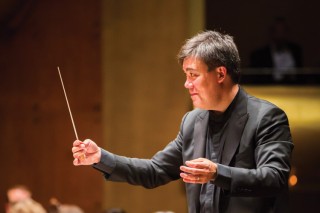Title

Alan Gilbert
(Photo by Chris Lee)When Alan Gilbert was recording Henri Dutilleux's Deux Sonnets de Jean Cassou with the Orchestre Philharmonique de Radio France and Renée Fleming ('86, voice/opera), the renowned composer was present for rehearsals. At one point, Gilbert recalled, Dutilleux stopped the ensemble and said: “I'm really sorry, it's entirely my fault, I was very young when I wrote this. If I had to do it again I would have marked it completely differently, it's just too loud.” And then he looked down at his score and said: “Oh, I did write pianissimo.” Gilbert said: “I'm sure he was just having everyone on, it was so funny. We were all so ashamed!” Gilbert (Pre-College '85; MM '94, orchestral conducting), the head of Juilliard's conducting and orchestral studies program, was recounting the tale in an interview with The Journal in advance of his leading the Juilliard Orchestra in Dutilleux's Tout un monde lointain... for cello and orchestra and Shostakovich's Symphony No. 4 on January 24.
Body
Regarding the choice of Tout un monde lointain for this program Gilbert explained: “The concerto is always chosen in consultation with the faculty, and I hadn't worked with a cello soloist at Juilliard before. It happens that the Dutilleux is also one of my favorite pieces—I think it's a masterpiece, as many of Dutilleux's works are,” he said. “I was quite close to Dutilleux, who was a hugely revered figure in the music scene in France and justifiably so. Over the years, I performed quite a lot of his music and spent time with him in Paris.” The recipient of the New York Philharmonic's inaugural Marie-Josée Kravis Prize for New Music in 2011, Dutilleux (1916–2013) was “an astonishing composer and musician and an amazing inspiration. I think it's great for cello students at Juilliard to have to contend with this piece because it's something very different from the Haydn Cello Concerto or Tchaikovsky's ‘Rococo' Variations.”
So what makes the Dutilleux unique? “The piece is so incredibly rich, poetic, evanescent, and mercurial—but there's also this unbelievable rhythmic core to the way he writes despite the improvisatory feeling of the music,” Gilbert said. “Dutilleux was always a pleasure to be around because you could tell that the innate musical talent, if it's possible to speak about a master in such a banal way, was just so astonishing. He really heard all the notes that he put down on the page, and his sense of harmony was incredibly developed. I remember rehearsals where he would point out wrong notes that were being played even in dense tone clusters.”
Gilbert also explained the reasoning behind pairing Shostakovich's Fourth with the Dutilleux. He plans the season with Ara Guzelimian, the provost and dean, and Adam Meyer (MM '04, viola), the director of the music division, noting that “the process has evolved over the years, so it's not only a question of trying to find pieces that are exciting for the orchestra to play and worthy educational projects,” Gilbert said. He also looks for pieces that provide contrast and “fill out the overall picture that we're painting over the years in our traversal of repertoire.” In addition, he hadn't done Shostakovich with the orchestra before, and “the Fourth happens to be my favorite of the Shostakovich symphonies,” he said. “It's bleak, harrowing, and honest, and famously is known as the most sincere utterance before he changed his style, supposedly to please the authorities, with his Fifth Symphony. There's nothing pandering or sugarcoated about the Fourth. It's shattering—a massive work—and I think the orchestra will play it really brilliantly and hopefully get a lot out of the experience.”
The fact that Shostakovich's Fourth requires the biggest orchestra of any of his 15 symphonies does raise certain challenges. “Any work that's played by such a large orchestra has to balance the need for cohesion and range of forces that are deployed because there are bound to be more intimate moments, and making sure that everyone both knows their place in the whole picture but also feels fully engaged and valued despite the potential anonymity of such a large group is important,” Gilbert said. “It's what an orchestra is about.”




